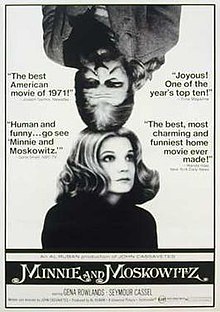Minnie and Moskowitz
This article does not cite any sources. (March 2014) |
| Minnie and Moskowitz | |
|---|---|
 Theatrical release poster | |
| Directed by | John Cassavetes |
| Written by | John Cassavetes |
| Starring | Gena Rowlands Seymour Cassel Val Avery Timothy Carey Katherine Cassavetes Lady Rowlands John Cassavetes |
| Distributed by | Universal Pictures |
Release date |
|
Running time | 114 minutes |
| Country | United States |
| Language | English |
Minnie and Moskowitz is a 1971 American romantic comedy-drama film written and directed by John Cassavetes, and starring his wife Gena Rowlands and actor Seymour Cassel in the title roles of Minnie and Moskowitz, respectively.
Plot[]
Seymour Moskowitz is an eccentric and uncouth parking attendant who has just moved from New York to Los Angeles. Minnie Moore is a museum curator in an abusive and toxic relationship with a married man named Jim. Following their fight, she becomes disillusioned by love and meaningful relationships. Minnie talks with a friend about getting older and her chances of finding the right man for her.
The next day, Minnie is set up on a blind date with a bitter and loudmouthed widower, Zelmo. The date goes badly and ends with Zelmo chasing her out of the restaurant. Seymour, working the parking lot, witnesses the commotion and gets into a physical altercation with Zelmo. Seymour wins the fight, bloodying Zelmo's face, who drives away crying and strands Minnie. Seymour offers to give her a ride, which she refuses, but he pursues her in his truck and forces her inside. She demands he drop her off at her workplace, the LA County Museum, which he does. Jim is waiting inside with his son and breaks off the relationship, revealing that his wife attempted suicide. Minnie is infuriated and hurt and slaps Jim.
Seymour shows up at Minnie's house to confront her about costing him his job. He takes her to a bar for a drink, then proclaims his love for her at a hot dog stand and berates her for taking herself too seriously when she doesn't return his affections. After dropping Minnie off, he brings a lady friend back to his apartment who stays overnight. Seymour calls Minnie to see her again and they go to ice cream parlor, then to a country western bar. In the parking lot, they dance to the music and kiss. When Minnie fails to introduce Seymour to her wealthy friends on the way into the bar, he angrily drives away and strands her just as Zelmo did. The wealthy male friend offers to drive her home. Seymour is waiting for them at her home, where he and her friend fight, injuring Minnie in the process.
Seymour brings Minnie inside to recover, where she admits that she doesn't see a future with Seymour. Insisting that they're meant for each other, he threatens to kill himself and then cuts his long moustache in a frenzy. She finally agrees to marry him and tells her mother about the news. Minnie and Seymour go to dinner with their mothers, who are hesitant and dubious about the prospects of their union. Seymour's mother calls him a "bum" and doesn't see the point of them marrying if there isn't a baby on the way, also telling Minnie that she could do much better than her son. Minnie's mother is overwhelmed and nearly speechless at the abruptness of the news and Seymour's appearance and personality.
Minnie and Seymour marry, laughing as the minister forgets his lines and fumbles for his notes. The film ends with a flash forward to a sunny backyard birthday party, possibly for their own child.
Cast[]
- Gena Rowlands as Minnie Moore
- Seymour Cassel as Seymour Moskowitz
- Val Avery as Zelmo Swift
- Timothy Carey as Morgan Morgan (as Tim Carey)
- Katherine Cassavetes as Sheba Moskowitz
- John Cassavetes as Jim (uncredited)
- David Rowlands as Minister
- Alexandra Cassavetes as Young girl in ballet tutu (uncredited)
- Zoe R. Cassavetes as Baby girl (uncredited)
- Lady Rowlands as Georgia Moore
- Holly Near as Irish
- Judith Roberts as Wife
- Kathleen O'Malley
Production[]
It was one of a small number of low-budget (less than $1 million) films bankrolled by Universal Studios in the early 70s, in an attempt to copy the success of Easy Rider. Several months after the film's release, Universal Studios decided to shorten the running time by cutting out a scene near the beginning of the film, even though it violated their contract with Cassavetes.[citation needed] All releases (including the Anchor Bay DVD) since that time are missing this scene.
Reception[]
The film received generally positive reviews. In 1973, Cassavetes was nominated for a Writers Guild of America Award for Best Comedy Written Directly for the Screen.
See also[]
External links[]
- 1971 films
- English-language films
- Films set in Los Angeles
- Films directed by John Cassavetes
- American films
- 1971 drama films
- Universal Pictures films
- American independent films
- American drama films
- Independent drama film stubs